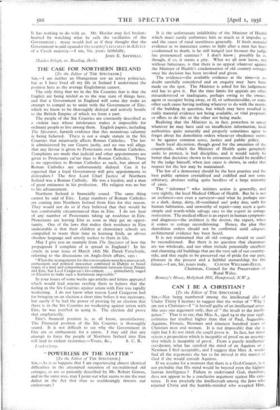" POWERLESS IN THE MATTER "
[To the Editor of THE SPECTATOR.] SIR,—As it so happens that I am experiencing almost identical difficulties in the attempted retention of reconditioned old cottages, as are so patiently described by Mr. Robert Graves, and in the same area, may I point out what seems to me the root defect in the Act that thus so maddeningly thwarts our endeavours ? It is the unfortunate infallibility of the Minister of Health which must surely embarrass him as much as it impedes us and the cause of rural seemliness generally. If fresh material evidence as to innocence comes to light after a man has been condemned to death, is he still hanged just because the judge has pronounced sentence ? I don't know ; possibly he is, though, if so, it seems a pity. What we all now know, not without bitterness, is that there is no appeal whatever against the Minister of Health's condemnation of old country cottages once his decision has been invoked and given.
The evidence—the available evidence at the time—is no doubt carefully considered and an enquiry may have been made on the spot. The Minister is asked for his judgement and has to give it. But the time limits for appeals are often misunderstood or inadequate, perhaps owing to the owner, agent or occupier being away, or ill, or unbusinesslike, or some other such cause having nothing whatever to do with the merits of the building in question, but which may have resulted in really material evidence not being available, or vital proposals or offers to do this or the other not being made.
Realising that the Minister is, in fact, powerless to unsay whatever he may have said on insufficient information, local authorities quite naturally and properly sometimes agree to forget about his demolition orders whenever obedience seems to be against common sense, justice and public policy.
Such local discretion, though good for the amenities of the countryside, which the Minister of Health quite genuinely seeks to protect, is bad discipline, and it would surely be better that decisions shown to be erroneous should be modified by the judge himself, when just cause is shown, in order that respect for the law may be maintained.
The law of a democracy should be the best practice and the best public opinion crystallised and codified and not some arbitrary, abstract ruling quite heedless of a large minority of cases.
The " informer " who initiates action is generally, and very rightly, the local Medical Officer of Health. But he is not an architect—not even a surveyor—and what he perhaps sees as a dark, damp, dirty, ill-ventilated and poky den, unfit for human habitation, and unworthy of repair—may seem a quite simple and worth-while salvage case to the e-{pert in cottage restoration. The medical officer is an expert in human symptoms and diagnosis—the architect is the doctor, the expert, when it comes to cottage reconditioning. Hence, the plea that demolition orders should not be confirmed until adequate architectural evidence has been heard.
It is not maintained that all old cottages should or could be reconditioned. But there is no question that clearances are too wholesale, and too often include potentially excellent and charming old buildings that are the very salt of our country- side, and that ought to be preserved out of pride for our past, pleasure in the present and a faithful stewardship for the
future.—I am, Sir, yours truly, CLOUGH WILLIAMS-ELLIS, Chairman, Council for the Preservation of
Rural Wales.
Romney's House, Hollybush Hill, Hampstead, N.W.3.














































 Previous page
Previous page